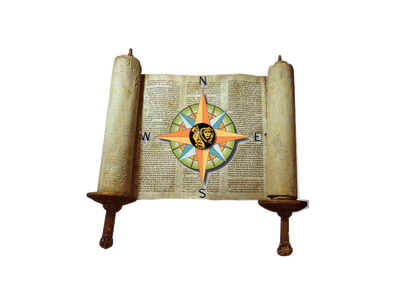
This week’s Torah portion, Mishpatim, includes a curious verse. I’m not sure everyone today would agree with it. The verse, Exodus 22:27, commands, “You shall not revile judges, nor put a curse upon a chieftain among your people.” Today, it seems, cursing our leaders is not just considered acceptable behavior, it’s practically our national pastime. I want to take a look at this commandment, what we think it means, and what it might teach us about our society today.
First, a word about the Hebrew words of this verse. The part of the verse that says that “you shall not revile judges” actually uses the word Elohim, which we usually translate as “God.” However, since ancient times, the rabbis have understood that the word Elohim sometimes means something more like “great people” or “powerful people.” The earliest commentators all agree that this verse is not talking about reviling God – which is certainly covered elsewhere in the Torah – rather, it is about not expressing hatred for human leaders – judges, kings, elected officials, officers of the court. Yet, the use of the word Elohim here is interesting, as I will discuss in a few minutes.
The ancient midrash collection, Mekhilta d’Rabbi Yishmael [22:27:1], says that the prohibition against cursing leaders applies as long as the leaders do their job as their jobs are defined. You may not like the way they do the job, you may think that you could do a better job, you may believe that they don’t really understand their job, but as long as they are not renegades who ignore the rules of their job, you may not curse them.
So, I want to suggest that the rule is not really about not cursing the person in the leadership position; it is about not reviling the position itself. We have a similar idea in American society today when we say things like, “You may not respect the President, but you still have to respect the office of the presidency.” There needs to be a basic understanding in a society that once we cross the line of despising our political system just because we don’t like the particular people in power, we have undermined the very existence of the system we all depend on to keep us safe, to hold our society together, and to prevent anarchy from overwhelming us.
In American society, we often call this understanding “the rule of law.” It is a phrase made popular in part by the writings of John Adams, the second President of the United States. Adams wrote that a good government should be “an empire of laws and not of men,” meaning that our civilization becomes stable, just, and worthy of sustaining itself when not even the most powerful people can excuse themselves from obeying the law and when every member of the society is subject to the rights, privileges, and limitations of the law on an equal basis. The moment that the law becomes a weapon to use “against thee, but not against me,” the rule of law is broken and those who wield power should be regarded as illegitimate and as immoral, authoritarian despots.
But in observing the rule of law, which despises self-serving autocrats, we also relinquish our claim to despise the people who rule in ways other than what we would choose ourselves. It is a two-way street. Leaders have an obligation to live within the rules; the rest of us have an obligation to accept the authority of the people who govern within the rules.
That seems to be what this week’s Torah portion is telling us. You are not allowed to curse your leaders just because you don’t agree with them; you are required to give the respect due to their office. The only alternative is to ally yourself with the causes of chaos and anarchy that will lead to the ruin of the society as a whole.
If you imagine that the commandment not to curse leaders was more easily obeyed in ancient times than it is today – if you believe that the leaders of the past were so much better than those we have today – if you believe that people loved and appreciated their leaders in the past more – I am sorry to say that you must have a poor understanding of the ancient world and a worse understanding of human nature.
The Torah goes out of its way to remind us about how many Israelites really hated Moses during his forty years of leading them in Egypt and through the wandering through the desert. The Hebrew Bible tells us clearly that King David, the other paragon of leadership in ancient Israel, was so deeply disrespected in his time that even his own wife criticized him publicly and his children tried to overthrow him.
It has always been so. No leader, no matter how great, is without detractors. The game of "King of the Mountain," in which people try to pull down the person at the top, is the oldest game in the world. We never get tired of it. The struggle to “throw the bums out” without, at the same time, allowing all of society to fall into lawlessness is as old as civilization itself.
This is the observation of the Torah. You can see it in the way that the Hebrew Bible never invests itself too much in any particular human ruler. Even Moses and David are shown to have serious flaws and they have eager detractors. But the law itself, the rules by which society is governed, is never attacked in the Torah. It is venerated far more than any human being could ever be.
This week’s Torah portion is a virtual monument to the idea of the rule of law. Parashat Mishpatim contains 53 laws, one of the most of any Torah portion. Among the laws in the portion are laws against crimes like murder and kidnapping and laws for civil conduct like the repayment of loans and compensation for accidental property damage. But at the center of the Torah portion are laws for the administration of the legal system itself. This week’s portion commands judges and other civil authorities, “You shall not side with the powerful to do wrong. You shall not give false testimony to favor the interests of the mighty. Nor shall you show favoritism toward the poor in a dispute…You shall not take bribes" (Exodus 23:2-3,8).
There is a lot for us to learn from the Torah’s commitment to the rule of law and faith in human systems of justice and governance. The world today is experiencing a crisis in the rule of law that is unlike any time since the end of the Second World War. Democracies are falling toward despotism in countries like Turkey, Poland and Hungary. In just the last eight months, coups with military support have overturned the rule of law in Myanmar, Mali, Tunisia, Guinea, Sudan, and Burkina Faso.
And, lest we think that the United States is somehow exempt, we have seen in our own nation definite signs of decay in the rule of law. We can see, perhaps, how it started when the Supreme Court ignored the ballots cast in Florida and installed George W. Bush as president in 2000. The fractures deepened in 2016 when many people called Donald Trump’s Electoral College win illegitimate because of his failure to win the popular vote. Now it has reached near crisis levels as one quarter of all Americans believe that the result of the 2020 elections were false and the election stolen. The belief is, of course, primarily promoted by the false claims of the losing presidential candidate and his refusal to concede, a line that has never been crossed before in the nation’s history.
How much longer can this go on? What happens when nobody in a society believes that the rules matter as much as “winning” matters? In such a society, the rules will collapse. The rules will just be changed, after the fact, by people who have the power to create new rules that produce the results they want.
Regardless of your partisan allegiances, regardless of your preferred policy positions, you should fear this. It is a recipe for chaos and disaster.
And there is something else we should notice. Remember how this week’s Torah portion uses the word Elohim for the people in positions of authority who must not be cursed? Remember how the word Elohim is usually translated as “God”? I don’t think it is a coincidence.
The Torah itself recognizes that once a society rejects the rule of law, it will also reject the rule of God. Once people have tasted the power that comes with the ability to change the rules however they want, whenever they want to get the results they want, they will never accept the idea of any authority over them – not the authority of justice, not the authority of a moral order, and not the authority of creation’s supreme Source. The Torah understands that accepting the rule of law within the human realm is a necessary step toward accepting the rule of Heaven in our spiritual lives and in our basic understanding of who we are in the universe.
We are commanded not to curse our leaders – even when we disagree with them, even when we believe that they are dead wrong – not because they are above criticism or beyond reproach. We are commanded to respect the framework of governance and the rule of law because it is the floor beneath our feet. It is the foundation of all we aspire to do as a civilization.
Today we are standing on the brink of stepping over the line that leads to chaos. It is time to take a step back and to remember that there are ideals and there is a vision of what we are meant to be that are beyond merely “winning.”
Shabbat shalom.






 RSS Feed
RSS Feed
